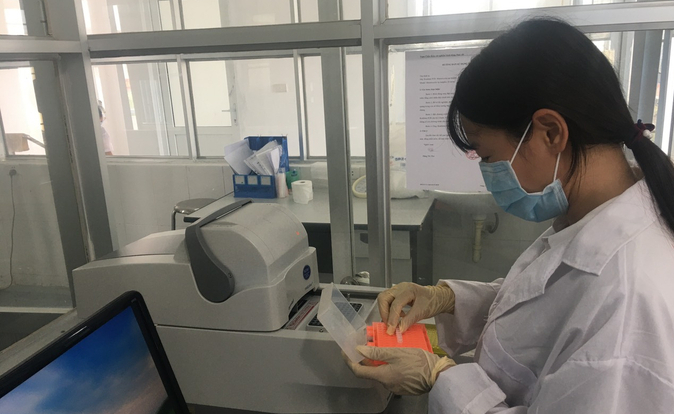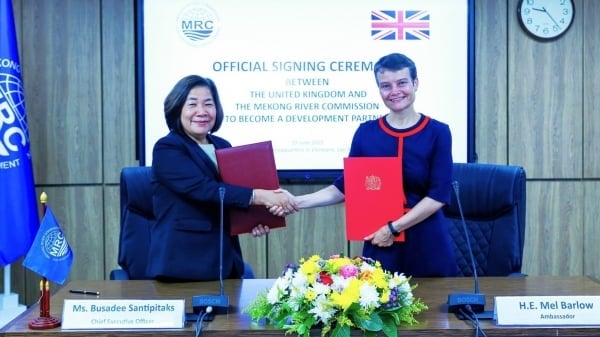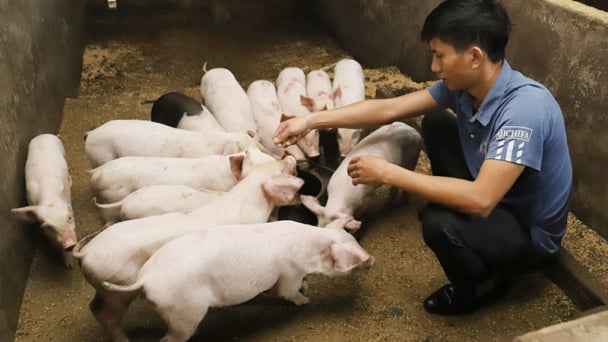June 20, 2025 | 15:01 GMT +7
June 20, 2025 | 15:01 GMT +7
Hotline: 0913.378.918
June 20, 2025 | 15:01 GMT +7
Hotline: 0913.378.918

Sea farming is a profession that brings high economic value to people in Quang Ninh province. Photo: Nguyen Thanh.
According to the Quang Ninh Provincial Sub-Department of Livestock and Veterinary Medicine, there is prolonged heat from May to October. In addition to the change of seasons in the North, livestock diseases quickly arise.
To control aquatic diseases, the Quang Ninh Sub-Department of Livestock and Veterinary Medicine has conducted monthly sampling of diseases on mollusks and marine fish for monitoring. From there, offer appropriate solutions to help farmers feel more secure.
At the end of July, Quang Ninh Provincial Sub-Department of Animal Husbandry and Veterinary Medicine implemented the implementation in Cam Dong and Cam Trung wards (Cam Pha city) and Dong Xa commune (Van Don district).
The results did not detect the pathogenic parasites Perkinsus Marinus and Perkinsus Olsen on mollusks and marine fish's virus-causing neural necrosis disease. Since the beginning of the year, there have been no disease outbreaks in oysters and marine fish in Quang Ninh province.
According to the World Organization for Animal Health regulations, two species of mollusks that cause disease, belonging to the endoparasitic protozoan Perkinsus group, must be declared in animal quarantine.
Perkinsus parasites can metamorphose from the vegetative phase to the resting spore in the water temperature range of 20-35 degrees Celsius. In which the temperature of 30-35 degrees Celsius is considered optimal. This temperature range usually occurs in the northern waters from early summer to early autumn.
The primary manifestation of the disease is slow-growing bivalve mollusks. The gonads slow down, reduce fertility, and slow the reproductive cycle. Mollusks float to the sand, open their shells, and die en masse.
In addition to oysters, diseases caused by Perkinsus parasites also appear in some bivalves, such as mussels, clams, pearl mussels, giant clams, and abalone.
Perkinsus causes a high mortality rate of up to 95%. In particular, the transmission mechanism occurs directly between mollusks without an intermediate host.
The Ministry of Agriculture and Rural Development recommends that mollusks and marine fish farmers absolutely should not stock up during unfavorable weather; Regularly monitor and check water environmental factors such as temperature, salinity, etc. If livestock reaches harvest size, it should be harvested urgently to avoid damage.

Sampling for disease testing on aquatic products and seafood. Photo: Nguyen Thanh.
If dead animals are detected, they should be immediately collected and treated to avoid spreading to living individuals; taking measures to clear stagnant water areas to prevent local water stagnation and high temperatures at noon.
On that basis, the agricultural sector of Quang Ninh province has been actively implementing monitoring and evaluation of the farming environment, supporting localities, aquaculture, and seafood farmers on the level of environmental pollution in the farming environment to have an appropriate handling process, disease safety, and ensuring quality standards of aquatic and seafood products.
In addition, building a product value chain, granting farming area codes and farming techniques for each aquatic and seafood species to ensure that it is suitable to the environmental capacity.
The Sub-Department of Livestock and Veterinary Medicine strictly manages the farming area according to the planning, repelling the situation of people spontaneously in aquaculture. In addition, the agricultural sector cooperates with functional sectors to review and zone marine spatial functions, clearly identify areas capable of aquaculture according to each specific aquaculture species, and develop a plan for aquaculture area allocation under Decree 11/2021/ND-CP of the Government.
Quang Ninh is one of the provinces possessing strengths in production and aquaculture, with over 2,000 large and small islands, a coastline of 250km, 40,000ha of tidal flats, over 20,000ha of straits, and bays with diverse marine biological resources.
To maintain the catch as well as protect the natural aquatic resources, in the last 10 years, the province has issued many policies to encourage the attraction of resources for marine economic development.
In particular, marine aquaculture is an area of interest and focus, making a solid contribution to promoting the development of the fisheries industry in the direction of increasing added value and sustainable development. The province also introduced many policies to attract investment from large enterprises to develop seafood.
Along with that, a series of solutions in the direction of "increasing farming, reducing exploitation" has been applied by the province, such as focusing on offshore fishing, reducing near-shore fishing, increasing industrial farming, intensive farming, and super-intensive farming, high-tech farming, reducing natural farming, and extensive farming.
The technical infrastructure system for aquaculture and fishing in most coastal localities is invested in Van Don, Cam Pha, and Co To, which often have many fishing boats.
Quang Ninh province focuses on objects of high economic value in marine aquaculture, such as grouper, yellowfin fish, and Pacific oysters...
Translated by Tu Quyen

(VAN) On June 19, the United Kingdom officially became a Development Partner of the Mekong River Commission.

(VAN) Biodiversity is being threatened by traditional remedies made from wildlife. Traditional medicine and humans must change to live in harmony with nature.

(VAN) Agrifood investment and finance solutions for people and the planet.

(VAN) Microplastic contamination has become pervasive in seafood, posing unprecedented challenges for food safety and marine ecosystems.

(VAN) Proactively using vaccines, combined with transport control and enhanced surveillance, is the only viable path toward biosecure and sustainable livestock production in Vietnam.

(VAN) Located in the southeast of Ho Chi Minh City, the Can Gio Mangrove Biosphere Reserve is considered the ‘green lung,’ a solid shield protecting the city.

(VAN) To address plastic pollution, closing the plastic recycling cycle will bring significant economic and environmental benefits.